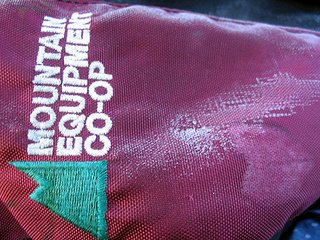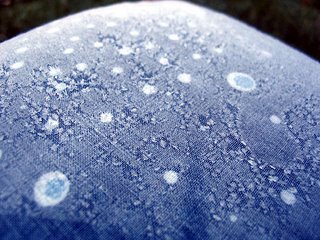Last night, I took part in the Global Night Commute, organized by Invisible Children. The purpose of the event was to raise awareness of the nearly 20-year-long rebel war in Northern Uganda and the horrific toll it has taken on the civilian population, of which 1.7 million people are displaced; 20-50,000 children have been abducted and forced to serve as soldiers and sex slaves; and 130 people die each day due to violence.
Each night, thousands of children commute on foot for miles from their homes in rural areas and sleep in city centres and "safe" areas to avoid abduction, only to repeat the commute the next morning. By doing the same for one night, thousands of people across the US, Canada, and several other countries including Ireland and Singapore, hoped to draw attention to the issue and force the hand of their governments to act.
I took part in the march in Durham, New Hampshire, on the University of New Hampshire campus. We met in a parkinglot on the west edge of town. As the time approached, busloads and carloads of people began accumulating, clutching backpacks and sleeping bags. By 7:00 we'd gathered the 200+ who'd signed up for the event. Most were UNH students; some were from local high schools; a few stragglers showed up from elsewhere, including the four from my church who took part. A couple of people had walked all the way from Dover, a distance of ten or twelve miles, starting their walk at 1:00 that afternoon.
After a few organizational remarks and a reminder about why we were all there, nine slow shots from a starter pistol set us off, and we started walking. The two-mile route mapped out for us wound around the centre of Durham. Two hundred plus people walking attracts a lot of attention; we made a long parade. People in passing cars stared, waved, yelled, honked their horns; a few asked what we were doing. A police escort watched over us and blocked off traffic till we passed.
Once we'd arrived at the designated spot, a grassy lawn in front of one of the UNH buildings, we threw down our sleeping bags and marked out our spots. The sun was going down and it rapidly grew chillier. Volunteers handed us each a stapled bunch of papers including instructions and three blank sheets: one for a letter to be written to President Bush; one for a letter to our Congressman; and one for an art project to be included in a yearbook-type of publication about the event. My two friends and I wrote our letters but opted out of the art project, for lack of enthusiasm and lack of light.
A video clip was shown; an informational presentation; a couple of people spoke; and in the end the Invisible Children documentary was played again. At one point the organizer of the event got up to warn us that the temperature was forecasted to drop below freezing that night. Did any of us want to sleep on an indoor track that was made available to us? A few tentative hands went up; the body elected to stay where we were. The feeling seemed to be that we'd committed ourselves; we might as well go the whole way.
As the night came and the chill grew deeper my friends and I cuddled down into our sleeping bags and snuggled together for warmth. A kind friend from another group lent us a tarp to spread under us, warning that the ground would get very wet. We struggled with our sleeping bags, tried to find the most comfortable and warmest position, talked and laughed, and eventually, as it grew late, fell asleep.
The best of us slept lightly. It is never comfortable sleeping on the ground or in a constrictive sleeping bag at any time. The high school and college kids laughed, talked, played baseball and guitars loudly till very late. I woke up a few times during the night and opened my eyes only to realize with chagrin that it was still dark and there were more hours to endure. My toes froze. My hips grew alternately sore as I rolled from side to side. It's a wonder any of us slept at all. It was a long night.
But we endured it. As the sun came up the next morning and the sky lightened from black to blue we woke groaning with cold, stiffness, and tiredness. We realized that frost was covering our sleeping bags, our backpacks, and even our pillows where our heads hadn't lain. Eventually the whole mound of people other than us had gotten up, packed up their sleeping bags and tarps, and sleepily stumbled off home. Finally Kyle, the lone guy in our number, bravely got up, sprinted back to his house, got his car, and drove back to give us a ride back to the parkinglot where we'd left our cars. We drove off our separate ways to shower and change and (in my case, at least) sleep another couple of hours before meeting up again for church.
And that was that. If it makes a difference, I'm glad I slept out one night in weather far too cold for any sane person to do so out of choice. One night of discomfort is nothing compared to what the kids in Northern Uganda suffer every night; and we had no fear of being abducted or marauded by any but rowdy college students. I'm thankful to have had the chance to take part, and I hope and pray it makes an impact that is felt permanently and significantly in Uganda.

Top: Frost on my backpack

Bottom: Frost on my pillow